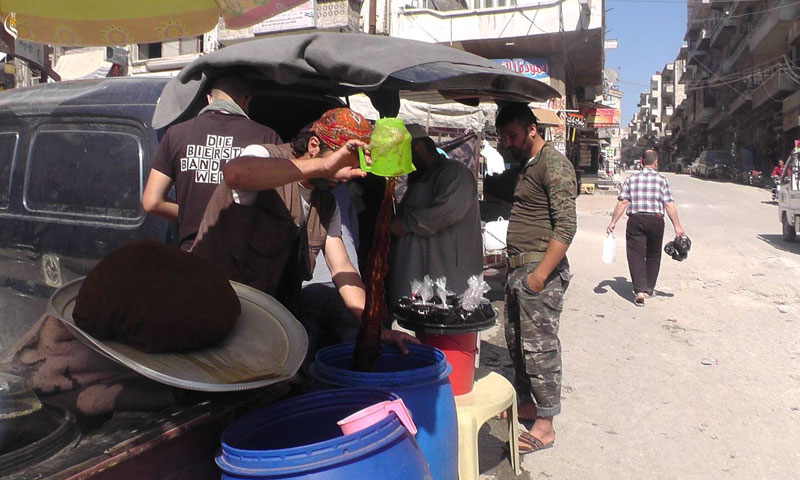



More than 20 humanitarian organizations, operating in Syria, have launched campaigns to raise money, with which they planned to purchase food parcels, provide iftar meals for fasting people and offer the Eid al-Fitr clothes for those in a dire need. However, the organizations had to change their plans, given the security circumstances threatening the area.
While people fast Ramadan, the eighth since the outbreak of the Syrian conflict, and hostilities in several areas in north-western Syria escalate, with the intensive aerial attacks by the Russian aircraft and the Syrian regime’s helicopters that led to the death of over a hundred persons and coerced 150 thousand others out of their houses, the campaigns are held as a reminder of the civilians’ conditions and their nonstop suffering during the month of worship and sharing.
The security chaos in Syria is not new to the population of the northern areas, nor to the humanitarian organizations operating there. In the case of Saed Charity (Help Charity), the situation has no major influence on its work.
In an interview with Enab Baladi, Kamal al-Mhaimeed, the Coordinator of the Charity’s Food Security Sector, said that their method of addressing the situation involves a lot of risks.
“We are committed to the standards of safety and security of both our team and beneficiaries. We also make sure that beneficiaries do not assembly at the distribution points when aircraft are hovering or confrontations break out,” al-Mhaimeed said. He added that the standards of humanitarian action prevent them from forsaking an area, unless there are reasons that exceed their coping capacities.
Based on the security situation, bombardment or confrontations, the organization’s schedule might be put off for a day or two, sometimes for a couple of hours, al-Mhaimeed said and pointed out that the principal part of the organization’s activities are implemented in the camps, where the security conditions are fine to a certain degree.
The escalation of hostilities means changing the campaign’s priorities. Abdulrazak Awad, the Director of the Food Security and Livelihoods Program of Violet Organization, said that target group of their Ramadan campaigns is usually the most vulnerable, including orphans and former IDPs.
“Triggered by the present hostilities and the current situation, all the campaigns might be redirected to the people who have been displaced afresh,” Awad told Enab Baladi.
He added that there are concerns that the situation might worsen, and greater needs might appear, which were not in mind.
On a similar note, Iyad al-Na’ssan, the Director of Atta Relief, the Hama Branch, said that the military escalation and the displacement waves that ensued “have doubled the suffering and the need to pay may efforts in reacting to it, through monitoring the locations of the vulnerable persons, in need for this aid.”
The recently displaced people turned into the most vulnerable segment for the majority of the organizations that Enab Baladi contacted. From Ataa Relief, Iyad al-Na’ssan said that the residents, suffering from fragilities, such as poverty, disability or the lack of a breadwinner, would all be covered by the campaign, according to “studied lists.”
In a message to Enab Baladi, al-Sham Humanitarian Foundation said that in its second Ramadan campaign it targets orphans and child patients, in addition to providing meals to families, based on its studies of the situation inside Syria and its former experience.
Kamal al-Mhaimeed, from Saed Charity, said that the Charity is following a mechanism to define priorities, under standards that cover the families which women, children or elderly make a living for and the ones, where a family member has a disability or a chronic disease, among other standards, which provide the charity with degrees, according to which the families are made into categories and the most vulnerable of them are defined.
Though these campaigns were granted significant contributions and support by donors, as most of the organizations reported, the needs’ gap is yet beyond their resources.
Abdulrazak Awad, from Violet, said that many an area in Northern Syria, Idlib city, in particular, suffered from the cessation of several projects, which doubled these area’s urgent need for aid. “We are not even meeting the needs of 5% of the families. […] The need is extreme. What is required is the solidarity of all the area’s relief organizations to try covering it. But we would not be able, unfortunately.”
The al-Sham Humanitarian Foundation reported that the effect of the massive aid delivered is barely evident.
The coordinator of the Food Security Sector at Saed Charity voiced the message above, expressing his hope that the efforts would consolidate and that they be in harmony as to cover the massive needs, as he put it.
In its statistics of Syria’s humanitarian needs for 2019, the UN estimated that 6.5 million persons are lacking food security and 2.5 others are at risk of losing it.
It also monitored the presence of 6.2 IDP’s inside Syria, half of them are in Northern Syria while more than 83% of the population is below the poverty line due to the lingering conflict and the huge losses suffered by agriculture and food production sectors.
if you think the article contain wrong information or you have additional details Send Correction